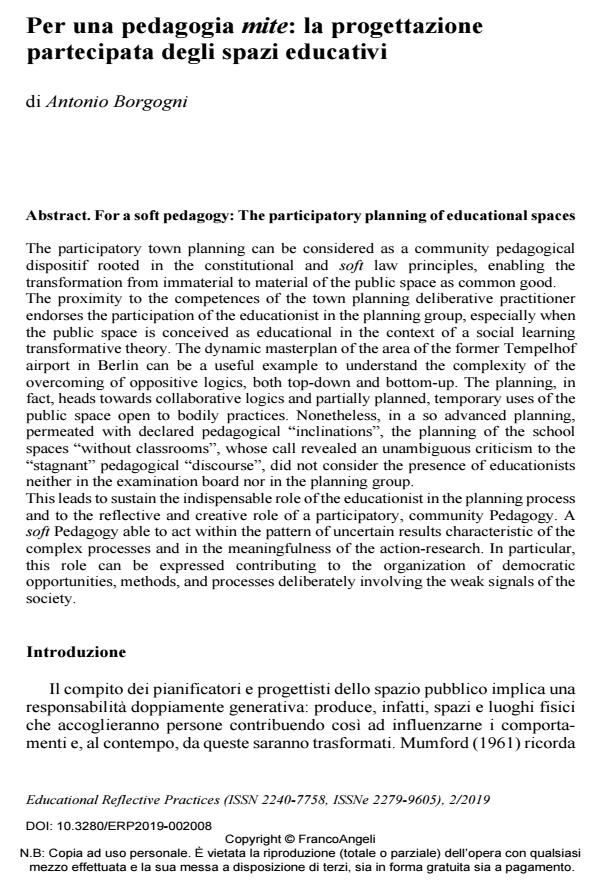For a soft pedagogy: The participatory planning of educational spaces
Journal title EDUCATIONAL REFLECTIVE PRACTICES
Author/s Antonio Borgogni
Publishing Year 2020 Issue 2019/2
Language Italian Pages 12 P. 138-149 File size 196 KB
DOI 10.3280/ERP2019-002008
DOI is like a bar code for intellectual property: to have more infomation
click here
Below, you can see the article first page
If you want to buy this article in PDF format, you can do it, following the instructions to buy download credits

FrancoAngeli is member of Publishers International Linking Association, Inc (PILA), a not-for-profit association which run the CrossRef service enabling links to and from online scholarly content.
The participatory town planning can be considered as a community pedagogical dispositif rooted in the constitutional and soft law principles, enabling the transformation from immaterial to material of the public space as common good. The proximity to the competences of the town planning deliberative practitioner endorses the participation of the educationist in the planning group, especially when the public space is conceived as educational in the context of a social learning transformative theory. The dynamic masterplan of the area of the former Tempelhof airport in Berlin can be a useful example to understand the complexity of the overcoming of oppositive logics, both top-down and bottom-up. The planning, in fact, heads towards collaborative logics and partially planned, temporary uses of the public space open to bodily practices. Nonetheless, in a so advanced planning, permeated with declared pedagogical "inclinations", the planning of the school spaces "without classrooms", whose call revealed an unambiguous criticism to the "stagnant" pedagogical "discourse", did not consider the presence of educationists neither in the examination board nor in the planning group. This leads to sustain the indispensable role of the educationist in the planning process and to the reflective and creative role of a participatory, community Pedagogy. A soft Pedagogy able to act within the pattern of uncertain results characteristic of the complex processes and in the meaningfulness of the action-research. In particular, this role can be expressed contributing to the organization of democratic opportunities, methods, and processes deliberately involving the weak signals of the society.
Antonio Borgogni, Per una pedagogia mite: la progettazione partecipata degli spazi educativi in "EDUCATIONAL REFLECTIVE PRACTICES" 2/2019, pp 138-149, DOI: 10.3280/ERP2019-002008